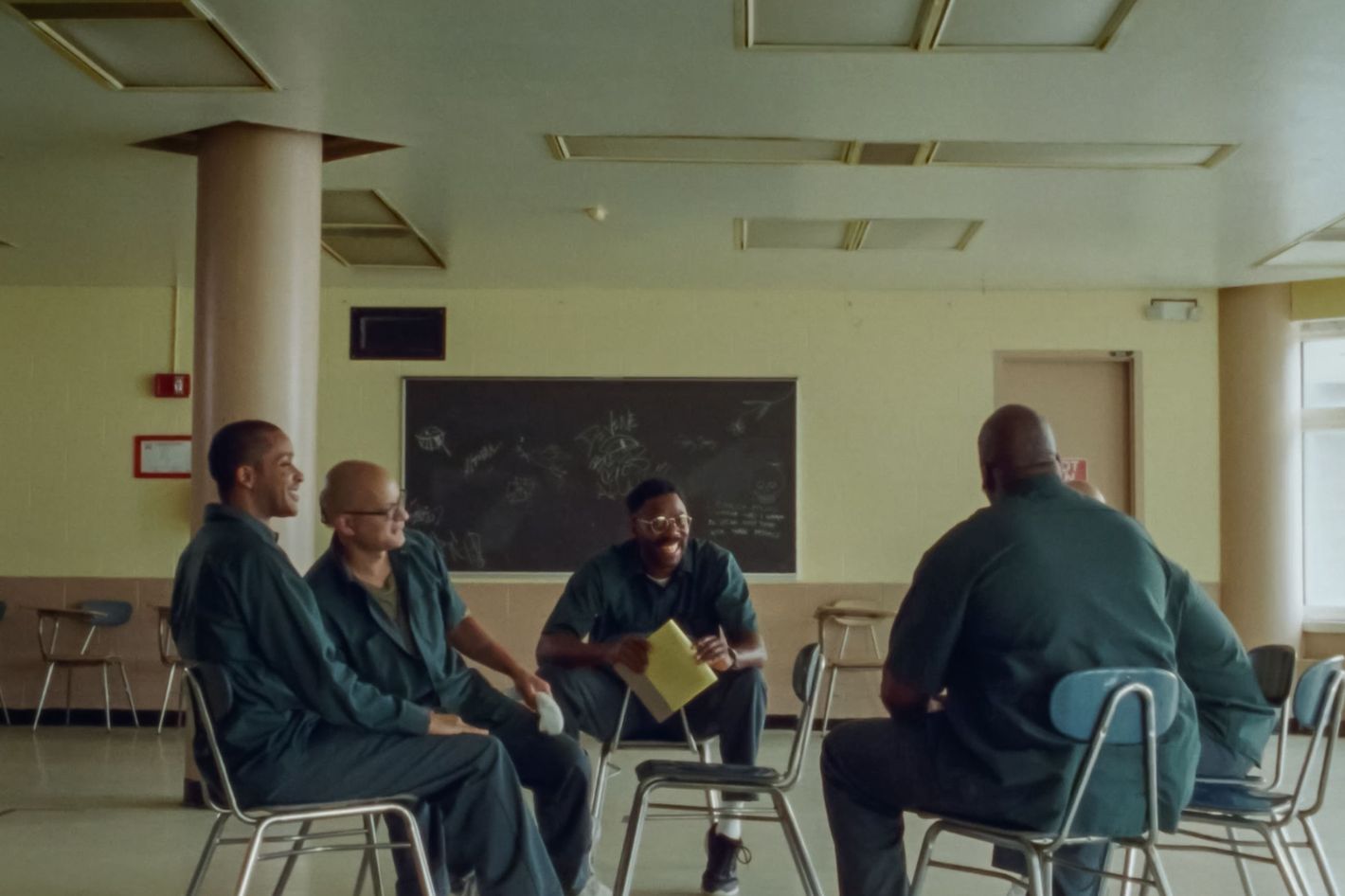Sing Sing Doesn’t Need a Movie Star’s Touch
The prison theater drama can’t square its naturalistic urges with its need to be an awardsy acting vehicle.

The camera closes in on Colman Domingo’s face early and often in Sing Sing, a film about a theater program set within the walls of the maximum security prison for which it’s named. The urge is understandable. Domingo’s is a genuine movie star face, defined by its elegant handsomeness and mobile features capable of transmitting emotions that the character he’s playing might not be fully aware of.
The film opens during a production of A Midsummer Night’s Dream that’s shot as though it were floating in space, the performers standing in front of an audience unseen in the dark. John “Divine G” Whitfield (Domingo) is playing Lysander, and as he delivers his speech — So quick bright things come to confusion! — we get a detailed look at his expression, which is rapt. He’s transported by the experience, as lit up from within by what he’s doing as he is by the spotlight. The crash back to earth happens backstage, as the cast members shed their costumes and line up to be counted by a corrections officer before being sent back to their cells. Incarceration is a crushing half-existence, and it’s obvious that those moments on stage provide one of the few opportunities for Divine G to feel fully alive.
The dissonance of Sing Sing comes from the fact that, as good as Domingo’s face is, it’s not as compelling as those of the first-time actors he’s sharing the screen with. Sing Sing, directed by Greg Kwedar (Transpecos) from a script he co-wrote with Clint Bentley, is based on Rehabilitation Through the Arts, which began at the Ossining prison in 1996 and has since expanded to five more in New York. Aside from Domingo, Sean San José (who plays Divine G’s best friend Mike Mike), and Paul Raci (who plays RTA volunteer Brent Buell), the film’s cast is made up of actual program alumni like David “Dap” Giraudy, Patrick “Preme” Griffin, Mosi Eagle, Sean “Dino” Johnson, and Camillo “Carmine” LoVacco, who are all playing variations on themselves. They’re not all naturals on screen, though the most prominent of them, Clarence “Divine Eye” Maclin, is so good that he almost rends the film in two with the rawness of his performance as a man learning that he doesn’t have to go through life balanced on the balls of his feet and prepared to fight. But the combined effect of their understated turns, along with the documentary-esque style of the film, which is heavy on handheld camerawork and natural lighting, ends up highlighting just how much work Domingo is putting in. There’s an artificiality to that visible effort that robs the film of some of its power.
I realize I’m criticizing a film about acting for having too much acting. But Sing Sing is a tender, earnest creation that isn’t about what art does for audiences so much as it is about what art does for those who are able to participate in it. The bulk of the movie spans the production of Breakin’ The Mummy’s Code, a patchwork time-travel comedy that Brent whips up over a weekend to provide a range of parts, from Egyptian princes to cowboys to Hamlet, for the whole ensemble. But the core of the drama is the relationship between the Divines — between G, the self-taught legal scholar, author, and reigning thespian of the group, and Eye, a newcomer otherwise known for prowling the yard and shaking down anyone he sees as weak. Eye has taken pride in making himself intimidating, loading himself up with invisible armor that’s antithetical to acting. But G sees something in him, and we do, too. While what Domingo’s performance is doing is turned outward, what his costars are engaged in feels more illuminatingly inward-turning. For the men in RTA, getting silly and getting serious about theater provides a sanctuary. Theater becomes a means of liberation, an escape hatch through which they can be released from the rigid expectations for how men are supposed to behave — rules that prison hardens into a matter of survival.
There’s a patina to Eye, as though years of being battered by the world have burnished him. Maclin, who shares story and executive producer credits with the real Whitfield (who makes a cameo appearance), portrays his character as someone who can flip from friendly to frightening on a dime. When he stands at the sidelines, glowering at the other men as they gladly get loose during warm-up exercises, you can understand why they’re all wary of his disrupting their hard-won dynamic — skeptical that this guy who arrives with a knife in his waistband is not really there to be part of the group, but to ruin it. And when G takes him aside to a barred window overlooking the Hudson early on in rehearsals to dispense some unasked-for advice, the interaction is staged like someone trying to handle an abused rescue dog just as likely to lash out with fangs bared as to accept contact. They don’t use the n-word in their group, G tells Eye, they use “beloved” instead — an endearment so unabashedly sentimental that the prospect of this mercurial tough guy uttering it is laughable in the moment. By the time he does, having gradually been worn down and cracked open by the process of putting on a show, it’s unbearably moving.
Sing Sing may be an awkward chimera of a film, combining vibrant source material with synthetic attempts to serve as a star vehicle, but its insistence on the healing capacity of art is enough to soften the hardest of hearts.
